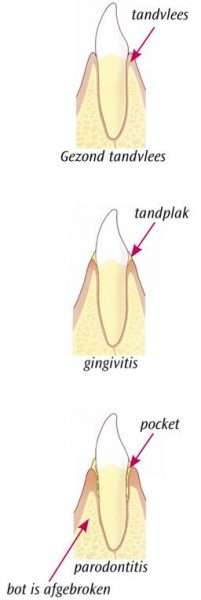Diabetes and oral health
Diabetes and oral health
This is what diabetes does with the mouth
Do you have diabetes? Then pay extra attention to your teeth and gums. People with diabetes are more likely to have problems with their teeth and gums. This may be due to too much sugar in your blood. And the amount of blood sugar remains less stable with problems in the mouth. This way you can go around in a circle. Here's what diabetes does to your mouth and teeth and what you can do yourself to prevent problems. You will also find tips, questions and answers. This is what diabetes does with the mouth
People with diabetes are more at risk of:
- gum inflammation (gingivitis)
- gingivitis with loss of jaw bone (periodontitis)
- fungal infections
- dry mouth
- cavities
With diabetes, problems in the mouth are extra annoying, because it makes it more difficult for the blood sugar level to stay good.
- Healthy gums are pink, tight around the teeth and do not bleed when you brush your teeth.
- Red, swollen or bleeding gums usually indicate inflamed gums. Plaque on the transition from your gums to your tooth and the plaque between your teeth cause inflamed gums. This stage is called gingivitis.
- There is a small space (pocket) between the tooth and the gums. Inflamed gums become detached from the teeth and molars. As a result, that space becomes deeper. The inflammation in the gum line can spread towards the jaw bone. The inflammation causes the fibers to break and the jawbone to break down. This is called periodontal disease.
Someone with diabetes is more susceptible to inflammation and infection. So the gums and jawbone also inflame faster. This happens especially when the blood sugar is often too high. So with poorly 'adjusted' diabetes, where it is not possible to keep the blood sugar level at a good level.
Do you often have too much blood sugar? Then your body wants to get rid of that sugar by urinating a lot. You often have a drier mouth. Saliva protects your teeth in a natural way. If you have less saliva, cavities and gum infections are more likely.
Many people with diabetes also have poorer blood flow in the body. This especially happens if someone has frequent high blood sugar for many years. The blood vessels then become damaged. That is one of the reasons that, for example, wounds but also inflammations heal more slowly. And inflammation in the body causes higher blood sugar. The gums are full of tiny blood vessels. If these are damaged, you are more likely to get gingivitis and periodontitis.
Tip: Do you have diabetes? Ensure a healthy blood sugar level, which prevents many problems. Ask your doctor or diabetes nurse what you can do to improve your blood sugar levels.

What is Diabetes?
Diabetes is another word for diabetes. It has to do with blood sugar: the fuel for the body. In diabetes, the body can no longer remove sugar from the blood. Too much blood sugar is unhealthy and after a while damages the eyes, kidneys, mouth and blood vessels, among other things. Blood pressure and cholesterol are also often too high. Therefore, medications are needed to lower the amount of sugar in the blood (also called blood sugar or blood sugar level). Diabetes is a chronic disease and has no cure. There are different types of diabetes.
Want to know more about diabetes? Click here
Questions and answers about diabetes and oral health
How do you prevent mouth problems?
People with diabetes can prevent dental and gum problems in many cases. This helps:
• Good blood sugar levels.
• Good oral hygiene is extremely important. Ask your dentist or dental hygienist for advice.
• Brush your teeth for two minutes twice a day with fluoride toothpaste.
• Use a soft toothbrush.
• In addition, clean the spaces between your teeth with brushes, dental floss or toothpicks.
• Limit the number of eating and drinking moments to seven per day.
• Stop smoking.
• Visit your dentist or dental hygienist twice a year and tell them you have diabetes.Do you wear dentures? Then the same advice applies. Keep your teeth and mouth clean. Infections under the dentures are common in diabetic patients with dentures. Therefore, visit the dentist or dental hygienist twice a year.
How do you get good blood sugar levels?
Your GP or nurse will check your blood sugar at least four times a year. Consult with your practitioner or ask the pharmacy whether you can also measure your blood sugar at home with a glucose meter. How often you should measure your blood glucose levels depends on your diabetes treatment. And also how well your diabetes is controlled. So that differs per person. Check this with your general practitioner, diabetes nurse, practice nurse or internist. A healthy blood sugar level (fasting) is between 4.5 and 8.0 mmol/l.
When do I go to the dentist or dental hygienist?
Do you have diabetes? Then go to the dentist or dental hygienist at least twice a year. Go even if you have no complaints. You do not yet notice many oral disorders yourself, but your practitioner will notice them.
Common oral problems in diabetic patients are:
• Red or swollen gums.
• Bleeding gums, spontaneously, when eating or brushing your teeth.
• Pain in the mouth.
• Cavities.
• Sensitive or sore teeth when eating or drinking something hot or cold.
• Loose teeth or molars.
• Wounds, spots or sores in the mouth.
• A dry mouth.
• Changed taste.
• Bad breath or a bad taste in the mouth.
• Poorly fitting dentures.
Can I have dental treatment if I have diabetes?
If your blood sugar levels are not good, you can undergo dental or gum treatment without any problem. In that case, tell your doctor that you have diabetes. Those who have pain in the mouth may eat less or use more liquid food. This can affect your blood sugar levels. Do you eat or drink differently than usual? Then talk to your doctor or nurse and have your blood sugar checked extra.
I have diabetes and have undergone dental or gum treatment. What should I pay attention to?
After a treatment on your teeth or gums, you may be advised not to eat or drink for a while. This can cause your blood sugar to drop too low, so you could get a 'hypo'. If you have a hypo, for example, you may start to shake, sweat or become dizzy. Therefore, always inform your healthcare provider that you have diabetes. Make an appointment at a convenient time for you. Choose the time so that you have had enough to eat or drink before the treatment.
Does smoking affect a diabetic patient and oral health?
Do you have diabetes, do you not take good care of your teeth and do you smoke? Your jawbone will then break down faster than normal. Because smokers have poorer blood flow in the gums. As a result, the gums do not or hardly bleed, even though they are inflamed. Smokers suffer more from gum disease (gingivitis) and gum disease with bone loss (periodontitis). In addition, you are more likely to suffer from high blood sugar due to smoking.
Do you want to quit smoking? Congratulations! You have a better chance of success if you use a tool with it. More information can be found at www.ikstopnu.nl

Where can I find more information about diabetes?
For more information about diabetes, please visit website of the diabetes fund. You can of course also contact your general practitioner, diabetes nurse, practice nurse or internist. Do you have any questions about your oral health? Then look further on this site or contact your dentist or dental hygienist.